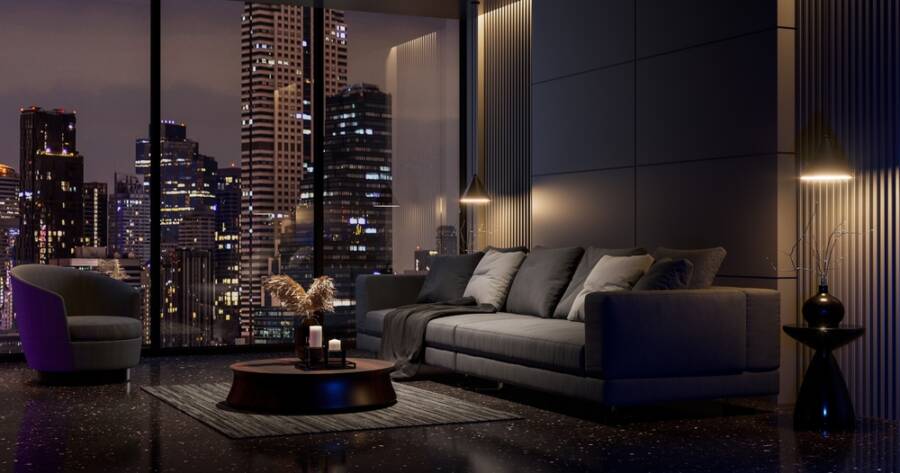In today’s dynamic real estate market, luxury apartments have emerged as one of the most coveted investment options for modern homebuyers. While purchasing a home has always been considered a significant financial commitment, the luxury apartment market offers unique benefits that go beyond mere aesthetics or lavish features. With rising demand from affluent buyers, strategic location choices, and the potential for strong long-term returns, luxury apartments are quickly becoming a key part of investment portfolios.
The Appeal of Luxury Living
When considering an investment, it’s important to factor in both lifestyle appeal and financial growth potential. Luxury apartments often feature prime locations, state-of-the-art amenities, and spacious living arrangements that are designed to attract high-income buyers or renters. These elements can make luxury living seem almost irresistible.
For buyers, the appeal lies in the comfort, security, and convenience that such properties offer. Modern amenities such as fitness centers, 24/7 concierge services, and private parking spaces contribute to a highly desirable living experience. These features are tailored to meet the needs of people who seek a lifestyle that blends convenience with opulence.
Real Estate Market Trends and Long-Term Value
Real estate investments are often viewed as a reliable method of building wealth over time, and luxury apartments are no exception. In many metropolitan areas, properties in prime locations have demonstrated consistent value increases, making them attractive to homebuyers and investors alike.
This trend is especially true in cities where urban development is ongoing, or where areas are undergoing significant revitalization efforts. By purchasing a luxury apartment in these locations, investors position themselves for future financial growth, potentially reaping the benefits of gentrification or redevelopment.
While no real estate investment is without risk, higher-end properties often appeal to a wealthier demographic that can weather financial instability better than other buyers. This dynamic may provide a certain level of stability, especially when compared to the volatility of other sectors of the housing market.
Rental Income Potential: A Steady Stream of Revenue
One of the standout benefits of investing in a luxury apartment is the potential for generating significant rental income. Luxury apartments often attract a particular type of renter—typically individuals with high disposable income looking for a premium living experience. As demand for high-end rental properties increases in desirable areas, the potential for securing a consistent and lucrative rental income grows.
Luxury apartments also allow for more flexibility in terms of rental pricing. Landlords can adjust rental rates to reflect market conditions, as well as the value of unique amenities, premium finishes, or exclusive locations. While it’s important to note that rental markets can fluctuate, properties in desirable areas tend to attract tenants even during periods of economic uncertainty. These apartments may also benefit from short-term rental programs such as those offered through platforms like Airbnb, enabling investors to capitalize on both long-term tenants and short-term guests.
Diversification of Investment Portfolio
For investors looking to diversify their portfolios, luxury apartments can provide an excellent means of doing so. While stocks, bonds, and other financial instruments offer various benefits, real estate provides a tangible asset that can act as a hedge against market volatility. By adding luxury apartments to their portfolio, investors can benefit from a more balanced approach to wealth building. Real estate is generally less correlated with stock market movements, so it can help reduce risk in the overall portfolio, especially in uncertain economic times.
Luxury apartments, in particular, offer a relatively stable investment due to their consistent demand in sought-after locations. This makes them attractive not only for individual buyers but also for investment firms or funds looking to enter the real estate market. Moreover, luxury properties often have the potential to generate both short-term returns (through rental income) and long-term capital gains, offering a well-rounded investment.
Enhanced Lifestyle and Prestige
While financial considerations are at the heart of many investment decisions, there’s also an element of prestige that comes with owning a luxury apartment. The experience of living in or owning such a property can offer intangible benefits, such as improved status and access to exclusive amenities. The psychological value of a luxurious home may enhance an individual’s quality of life, which in turn can make it an even more attractive investment.
Buyers may also enjoy a sense of pride in owning a property that reflects their personal tastes and aspirations. Luxury apartments are often located in areas that provide easy access to cultural centers, high-end shopping, dining, and entertainment, further elevating the lifestyle that ownership offers. This connection between lifestyle and investment makes luxury apartments particularly appealing to modern homebuyers who prioritize both financial and experiential value.
Is a Luxury Apartment the Right Investment?
The decision to invest in a luxury apartment ultimately depends on individual financial goals and preferences. While the high initial cost may seem daunting to some, the long-term financial and lifestyle benefits of owning or renting luxury real estate cannot be overlooked. From the potential for strong appreciation in value to consistent rental income and a diversified investment portfolio, luxury apartments can provide an excellent avenue for building wealth.
Additionally, the lifestyle advantages and prestige associated with owning a luxury property further enhance its appeal. However, it’s important for potential investors to conduct thorough research and assess their own financial situation before committing. In a fluctuating market, a luxury apartment may be a solid investment, but like any property purchase, it carries inherent risks that need to be carefully considered.



